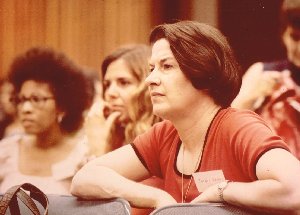Jacqui Ceballos: Fighter for feminist cause

Jacqueline (Jacqui) Michot Ceballos, 87, of Phoenix fought for women’s rights for almost half a century.
These struggles took her into the streets, where she marched alongside other U.S. feminist leaders such as Betty Friedan, Gloria Steinem, Kate Millet, and Congresswoman Bella Abzug.
Ceballos joined the feminist movement to end sex discrimination and violence against women, and to achieve reproductive free choice and equal pay.
For her many years of dedicated service to the feminist cause, Ceballos was awarded the Kate Millet Award last year in New York, surrounded by many of her fellow fighters for women’s rights.
Now living in Phoenix, Ceballos said the injustices against women were too great not to actively get involved in trying to change things.
She was raised in the South during the Great Depression and during the time of racial segregation. She recalls being upset that Blacks had to ride in the back of the bus.
“Once I urged a Black woman to sit in the front of the bus with me. She murmured fearfully, ‘Please Missis, NO.’ So I sat in the back with her, a decision almost as bad. We were lucky the bus driver only made a menacing remark.”
Ceballos remembers that women could be clerks or teachers, but ultimately had to marry. In her sixth-grade history book, there was only one small paragraph about the suffrage movement. When she tuned to a radio program about the suffragists, her father yelled at her, “Turn that thing off!”
“All this awakened my awareness of the extreme inequality of women,” she said. “I think I was born a feminist.”
She once got into an argument with her conservative mother about sexual equality. “I’d say, ‘If men can do it (meaning sex before marriage), so can women!’ She thought I’d end up a whore. It took her a while to accept the feminist movement, but in 1971 she got her chapter of the Catholic Daughters to sponsor the Equal Rights Amendment.”
Ceballos got involved with the feminist movement and soon was helping to plan demonstrations and marches that drew huge crowds, mostly women. In 1970, she helped Friedan organize the Strike for Equality, in which feminists unfurled a 40-foot banner saying WOMEN OF THE WORLD UNITE after they took over the Statue of Liberty.
In 1971, she became the New York chapter president for the National Organization for Women, and later in life founded the national, feminist organization Veteran Feminists of America, of which she is still president.
Also in 1971, she participated in a debate on feminism with famed writer Norman Mailer and Germaine Greer that was later included in a film documentary. Ceballos also assisted Friedan in organizing demonstrations against the New York Times for its all-male staff and classified ads separated into “Men” and “Women.” She also served as representative to the United Nations International Women’s Conference.
In 1975, Ceballos opened a PR firm that founded a feminist speakers’ bureau, and introduced the first women’s studies course, which planted the seed for future women’s studies courses on college campuses.
During her life, her passion for advocacy took its toll on her personal relationships. When she was a young girl, she lived in Lafayette, Louisiana. She moved to New York in 1945, where she met Alvaro Ceballos, a Colombian businessman.
Her husband took her to live in Bogota. However, her boldness and independence (for a woman in those times) in starting the city’s first opera company led to their eventual divorce.
Ceballos said she is working on a book about the history the U.S. feminist movement that she hopes to finish before she dies.
“We accomplished a lot,” Ceballos said. “Today we are up against conservatives who want to take away the gains we’ve won. Still, I have faith that today’s young feminists will pick up the banner for complete equality worldwide for women.”
“We all have something to do in our lifetimes,” she said. “I did what I was supposed to do.”















